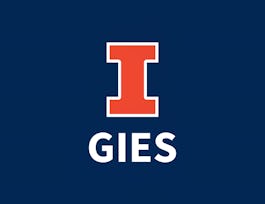This course introduces an overview of financial analytics. You will learn why, when, and how to apply financial analytics in real-world situations. You will explore techniques to analyze time series data and how to evaluate the risk-reward trade off expounded in modern portfolio theory. While most of the focus will be on the prices, returns, and risk of corporate stocks, the analytical techniques can be leverages in other domains. Finally, a short introduction to algorithmic trading concludes the course.


Applying Data Analytics in Finance
Taught in English
Some content may not be translated
23,405 already enrolled
(208 reviews)
What you'll learn
Understand the forecasting process
Describe time series data
Develop an ARIMA Model
Understand a basic trading algorithm
Details to know

Add to your LinkedIn profile
21 quizzes
See how employees at top companies are mastering in-demand skills


Earn a career certificate
Add this credential to your LinkedIn profile, resume, or CV
Share it on social media and in your performance review

There are 5 modules in this course
In this course, we will introduce a number of financial analytic techniques. You will learn why, when, and how to apply financial analytics in real-world situations. We will explore techniques to analyze time series data and how to evaluate the risk-reward trade off expounded in modern portfolio theory. While most of the focus will be on the prices, returns, and risks of corporate stocks, the analytical techniques can be leveraged in other domains. Finally, a short introduction to algorithmic trading concludes the course.
What's included
4 videos5 readings1 quiz
In this module, we will introduce an overview of financial analytics. Students will learn why, when, and how to apply financial analytics in real-world situations. We will explore techniques to analyze time series data and how to evaluate the risk-reward trade off expounded in modern portfolio theory. While most of our focus will be on the prices, returns, and risks of corporate stocks, the analytical techniques can be leveraged in other domains. Finally, a short introduction to algorithmic trading concludes the course.
What's included
7 videos2 readings5 quizzes1 ungraded lab
We will introduce analytical methods to analyze time series data to build forecasting models and support decision-making. Students will learn how to analyze financial data that is usually presented as time series data. Topics include forecasting performance measures, moving average, exponential smoothing methods, and the Holt-Winters method.
What's included
15 videos2 readings7 quizzes1 ungraded lab
In this module, we will begin with stationarity, the first and necessary step in analyzing time series data. Students will learn how to identify if a time series is stationary or not and know how to make nonstationary data become stationary. Next, we will study a basic forecasting model: ARIMA. Students will learn how to build an ARIMA forecasting model using R.
What's included
11 videos2 readings4 quizzes1 ungraded lab
We will introduce some basic measurements of modern portfolio theory. Students will understand about risk and returns, how to balance them, and how to evaluate an investment portfolio.
What's included
15 videos4 readings4 quizzes1 ungraded lab1 plugin
Instructors


Recommended if you're interested in Leadership and Management

University of Illinois at Urbana-Champaign

HEC Paris

University of Illinois at Urbana-Champaign

University of Minnesota
Why people choose Coursera for their career




Learner reviews
Showing 3 of 208
208 reviews
- 5 stars
65.38%
- 4 stars
24.51%
- 3 stars
3.36%
- 2 stars
3.36%
- 1 star
3.36%
New to Leadership and Management? Start here.

Open new doors with Coursera Plus
Unlimited access to 7,000+ world-class courses, hands-on projects, and job-ready certificate programs - all included in your subscription
Advance your career with an online degree
Earn a degree from world-class universities - 100% online
Join over 3,400 global companies that choose Coursera for Business
Upskill your employees to excel in the digital economy
Frequently asked questions
Access to lectures and assignments depends on your type of enrollment. If you take a course in audit mode, you will be able to see most course materials for free. To access graded assignments and to earn a Certificate, you will need to purchase the Certificate experience, during or after your audit. If you don't see the audit option:
The course may not offer an audit option. You can try a Free Trial instead, or apply for Financial Aid.
The course may offer 'Full Course, No Certificate' instead. This option lets you see all course materials, submit required assessments, and get a final grade. This also means that you will not be able to purchase a Certificate experience.
When you purchase a Certificate you get access to all course materials, including graded assignments. Upon completing the course, your electronic Certificate will be added to your Accomplishments page - from there, you can print your Certificate or add it to your LinkedIn profile. If you only want to read and view the course content, you can audit the course for free.
You will be eligible for a full refund until two weeks after your payment date, or (for courses that have just launched) until two weeks after the first session of the course begins, whichever is later. You cannot receive a refund once you’ve earned a Course Certificate, even if you complete the course within the two-week refund period. See our full refund policy.


